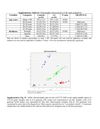January 2014 in “Journal of Jilin University” Higher levels of certain immune cells and proteins are linked to more severe lupus symptoms.
Using regulatory T cells and Rapamycin together improves chronic graft-versus-host disease treatment outcomes in mice.
 January 2010 in “프로그램북(구 초록집)”
January 2010 in “프로그램북(구 초록집)” Fgf9 helps create new hair follicles after injury through skin T cells.
 January 2004 in “Hair transplant forum international”
January 2004 in “Hair transplant forum international” The document couldn't be read, so there's no conclusion to summarize.
 32 citations,
January 2012 in “Clinical & Developmental Immunology”
32 citations,
January 2012 in “Clinical & Developmental Immunology” Targeting CD200 could be a new treatment for rheumatoid arthritis.
28 citations,
May 2012 in “Experimental Dermatology”  7 citations,
July 2020 in “Immunological Investigations”
7 citations,
July 2020 in “Immunological Investigations” The rs231775 genetic variant is linked to a higher risk and severity of Alopecia Areata in males.
 August 2024 in “OSMANGAZİ JOURNAL OF MEDICINE”
August 2024 in “OSMANGAZİ JOURNAL OF MEDICINE” The visfatin GT genotype may increase the risk of Alopecia Areata.
August 2019 in “International journal of dermatology and venereology” The calcineurin/NFAT pathway plays a significant role in the development and growth of a type of skin cancer called cutaneous squamous cell carcinoma.
 January 2017 in “Hair transplant forum international”
January 2017 in “Hair transplant forum international” Platelet-rich plasma (PRP) treatments are not effective.
32 citations,
January 2006 in “Liver transplantation” Vitamin A toxicity can cause severe health issues and may require a liver transplant if other treatments fail.
9 citations,
May 2014 in “BMC medical genetics” A woman with a unique syndrome similar to TRPS has a genetic change near the TRPS1 gene, affecting its regulation.
 2 citations,
January 2022 in “Genetics Research”
2 citations,
January 2022 in “Genetics Research” Using hemocoagulase with platelet-rich plasma in hip replacement can lessen blood loss and improve healing and blood clotting.
 1 citations,
May 2019 in “Cytotherapy”
1 citations,
May 2019 in “Cytotherapy” The new ddPCR method reliably detects unwanted viruses in CAR-T cell products, ensuring their safety for patients.
1 citations,
September 2015 in “Hair transplant forum international” Pashmina goats produce long hair-fiber due to specific gene expressions related to hair growth.
 March 2020 in “Hair transplant forum international”
March 2020 in “Hair transplant forum international” Taking minoxidil by mouth for hair growth might not be safe if you also take aspirin.
May 2015 in “Journal of the Egyptian Women's Dermatologic Society /Journal of the Egyptian Women's Dermatologic Society” 14 citations,
February 2003 in “Journal of the American Academy of Dermatology” Folliculotropic mycosis fungoides can affect the central nervous system in advanced stages.
3 citations,
September 2016 in “The Journal of Dermatology” A patient with leukemia/lymphoma also had multiple autoimmune diseases, suggesting a link between them.
18 citations,
January 2018 in “BMC dermatology” A new mutation in the PLEC gene causes a rare condition with skin blistering, muscle weakness, and hair loss.
9 citations,
November 2015 in “Plastic and reconstructive surgery/PSEF CD journals” Gene knockout mice developed scars similar to human hypertrophic scars, useful for studying scar progression.

Bee pollen, green tea, essential oils, and various plant extracts improve skin and hair health.
Deleting the MAD2L1 gene in mice led to rapid tumor growth despite chromosomal instability.
 1 citations,
October 2020 in “Journal of Cosmetic Dermatology”
1 citations,
October 2020 in “Journal of Cosmetic Dermatology” Possible link between hair loss and metabolic syndrome, with RANTES as a potential clue.
 421 citations,
April 2012 in “The New England Journal of Medicine”
421 citations,
April 2012 in “The New England Journal of Medicine” Alopecia Areata is an autoimmune condition causing hair loss with no cure and treatments that often don't work well.
286 citations,
August 2007 in “Journal of Clinical Investigation” Alopecia areata is an autoimmune disease where T cells attack hair follicles.
 104 citations,
October 1999 in “The Journal of Urology”
104 citations,
October 1999 in “The Journal of Urology” Finasteride doesn't harm male fertility or sperm quality, but may slightly reduce ejaculate volume.
82 citations,
October 1980 in “The Journal of Clinical Endocrinology & Metabolism” The child's body didn't respond well to vitamin D, causing hair loss and rickets.
 69 citations,
September 2006 in “Human Reproduction”
69 citations,
September 2006 in “Human Reproduction” Women with PCOS have fewer activated T cells in their ovarian follicles, which might affect fertility.













